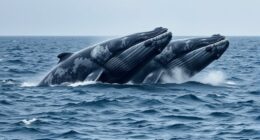Coral reefs are vital to the health of our oceans, supporting countless species and protecting coastlines. Yet, they face unprecedented threats that put their existence at risk. If these ecosystems continue to decline, the effects will ripple through marine life and human communities alike. Understanding what’s causing this crisis and how it impacts the broader environment is crucial—yet many aspects remain uncertain, prompting questions about our role in reversing the damage.
The Importance of Coral Reefs in Marine Ecosystems
Coral reefs play a vital role in maintaining healthy marine ecosystems, serving as the foundation for countless species. They provide essential habitats where fish, invertebrates, and other marine life find food, shelter, and breeding grounds.
Reefs support biodiversity, making oceans more resilient to environmental changes. They also protect coastlines by reducing the impact of waves and storm surges, preventing erosion and property damage.
Additionally, coral reefs contribute significantly to local economies through tourism and fishing industries. As a result, healthy reefs sustain food chains and support livelihoods.
When reefs thrive, they promote balanced ecosystems that benefit both marine life and human communities. Without these vibrant habitats, the stability and diversity of ocean life would decline, threatening the entire marine environment.
Causes Behind the Decline of Coral Reefs
While healthy reefs support diverse marine life and protect coastlines, their decline is driven by a combination of human activities and environmental changes. Pollution from agricultural runoff, sewage, and plastic waste introduces toxins that harm corals and stimulate algae growth, which smothers reef structures. Overfishing disrupts the balance of marine ecosystems, removing key species that keep algae in check. Climate change causes rising ocean temperatures, leading to coral bleaching and stress, while ocean acidification weakens coral skeletons, making them more vulnerable. Color accuracy is essential for accurately monitoring reef health and diagnosing issues early. Coastal development and destructive fishing practices physically damage reefs and disturb habitats. Collectively, these factors create a perfect storm that accelerates reef degradation, threatening their survival and the countless species that depend on them.
Ecological Consequences of Reef Bleaching and Death
When reefs bleach and die, the entire marine ecosystem suffers immediate and long-term consequences. You lose critical habitats that support countless species, from tiny invertebrates to large fish. A healthy reef ecosystem is essential for maintaining the balance of marine life and ensuring biodiversity. Fish populations decline because they rely on healthy corals for food and shelter. As coral structures break down, biodiversity drops sharply. The loss of coral cover also disrupts nutrient cycling, affecting water quality and productivity. Predators and prey relationships shift, causing imbalances that ripple through the food chain. Over time, the decline of reefs leads to reduced fish stocks, impacting local fishing industries and communities. The collapse of these ecosystems diminishes their resilience, making it harder for the ocean to recover from future stresses. Ultimately, reef death threatens the health of the broader marine environment and the livelihoods that depend on it.
Human Activities Impacting Reef Health
Human activities significantly threaten reef health through pollution, overfishing, and coastal development. When you dump waste or chemicals into the ocean, you introduce toxins that harm coral and marine life.
Overfishing reduces fish populations that keep algae in check, allowing algae to overgrow and smother corals.
Coastal development leads to sediment runoff, which clouds the water and blocks sunlight essential for photosynthesis.
You may also notice construction near reefs, which can cause physical damage.
These activities disrupt delicate ecological balances, making reefs more vulnerable to disease and bleaching.
Additionally, the destruction of natural wooden materials and other natural elements in coastal areas can contribute to habitat loss for many marine species.
If these practices continue, reefs will struggle to recover, losing their biodiversity and vital ecological functions.
Your actions, both directly and indirectly, impact the health and resilience of these precious ecosystems.
Strategies for Protecting and Restoring Coral Reefs
Protecting and restoring coral reefs requires a combination of targeted strategies that address both immediate threats and long-term resilience. You can help by supporting marine protected areas, which limit damaging activities like fishing and tourism.
Reducing your carbon footprint also plays a crucial role, as climate change accelerates reef bleaching.
Restoration efforts, such as coral gardening and transplanting healthy corals, directly rebuild damaged reefs.
Promoting sustainable fishing practices ensures fish populations recover, maintaining the balance needed for reef health.
Public awareness campaigns can foster community involvement and policy change.
Additionally, investing in research helps develop innovative solutions like assisted evolution and disease-resistant corals.
Utilizing crochet kits for beginners and other creative crafts can raise awareness and funds for reef conservation efforts by engaging communities in educational projects.
Conclusion
If you care about our oceans, you need to take action now. Protecting coral reefs means reducing pollution, supporting sustainable fishing, and fighting climate change. Every effort counts in restoring these vital ecosystems. By staying informed and making eco-friendly choices, you can help preserve coral reefs for future generations. Remember, healthy reefs support diverse marine life and protect coastal communities—so your actions can make a real difference.







